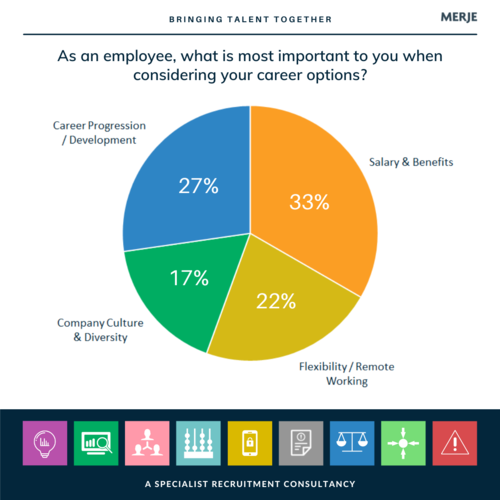Without any doubt, the events of the past 12 months and the ongoing pandemic have had a huge impact on the employment market. This has resulted in people reflecting on and re-evaluating their role and what is important to them.
Bearing all of this in mind, we opened a poll for our LinkedIn community to better understand which criteria and aspects of their role they value the most and what they look for in a potential future employer.

When considering the most important aspects which might sway their career pathway, the results, from highest to lowest, were as follows:
Salary and benefits (33%)
The simple fact of the matter is that salary is always a key factor in employee recruitment and retention. Organisations which pay competitive wages tend to attract and keep the best talent. While salary isn’t everything, it does factor heavily into an employee’s perception of their own worth within an organisation.
Employees also place a lot of emphasis on being able to enjoy a comprehensive benefits package. Benefits that employees find desirable may include a variety of options around healthcare insurance, paid annual, sick and maternity leave, travel reimbursement, training courses and the opportunity to gain industry related qualifications.
Career progression/development (27%)
Employees like the reassurance of knowing that there is a pathway which will enable them to travel along an upwards trajectory within an organisation. They do not want to feel like they’re moving nowhere and with zero possibility for career growth and development. Employers who promote from within and offer training, development and upskilling options will have a higher rate of employee retention than those who fail to take these steps.
Flexibility/remote working (22%)
Being able to strike a good work/life balance always presents a tangible bonus for employees, meaning they tend to value the opportunity to work flexible hours. This has particularly been the case during Covid-19, when families have had to juggle their own work day with home-schooling and other commitments.
Remote working looks like it’s here to stay for good and this will have the knock on effect of employees favouring roles where they can have earlier or later start times. They will continue to appreciate having the ability to work from home and avoiding the commute, as long as the lines between their personal and professional lives don't become blurred. Employers should implement frameworks to ensure this doesn't happen, while keeping the lines of communication open. By doing so, they should find that productivity remains on an even keel.
Company culture and diversity (17%)
Diversity and inclusion (D&I) rose to the fore in 2021 following the Black Lives Matter movement, and corporate responsibility has been in the spotlight as well thanks to increased awareness of the environmental and societal impacts that businesses can and should have.
We’re increasingly observing how large organisations such as Credit Suisse are implementing strong Environmental, Social & Governance and Corporate Social Responsibility policies and that this is filtering through to SMEs.
Having a clear, open culture of diversity and inclusion in the workplace is vital as it offers equal opportunities for all and the chance to cultivate a vibrant environment which represents a wide cross section of society. In fact, the latest swathe of Gen Z workers value workplace diversity and equality more than any other generation. This is alongside the promise of a culture which offers the chance to embrace new skills, while maintaining a stable career and decent work-life balance.
It’s fair to say that a positive working environment encompasses many factors, and businesses would be wise to cover off as many as possible to remain successful. Those employers who fail to provide a high quality working ethos and culture will inevitably have to deal with increased employee turnover as they seek out more attractive career options.
What to take away from this?
It seems that, no matter how vibrant and welcoming your workplace culture is, you will still experience staff turnover if you’re not offering salaries and benefits in line with the market. While many people have the added luxury of loving their jobs, the majority are working to pay their bills, so will always base their career decisions on being able to do this comfortably.
Offering the right salary levels and at least standard benefits will make your workforce feel valued and secure in their roles, lessening the likelihood of them logging on to a job board and seeing what else is out there.
If you would like to discuss the topics we cover in this or any of our other articles, or if you’d like expert support with your recruitment / job searching, please get in touch:info@merje.com

.png)

